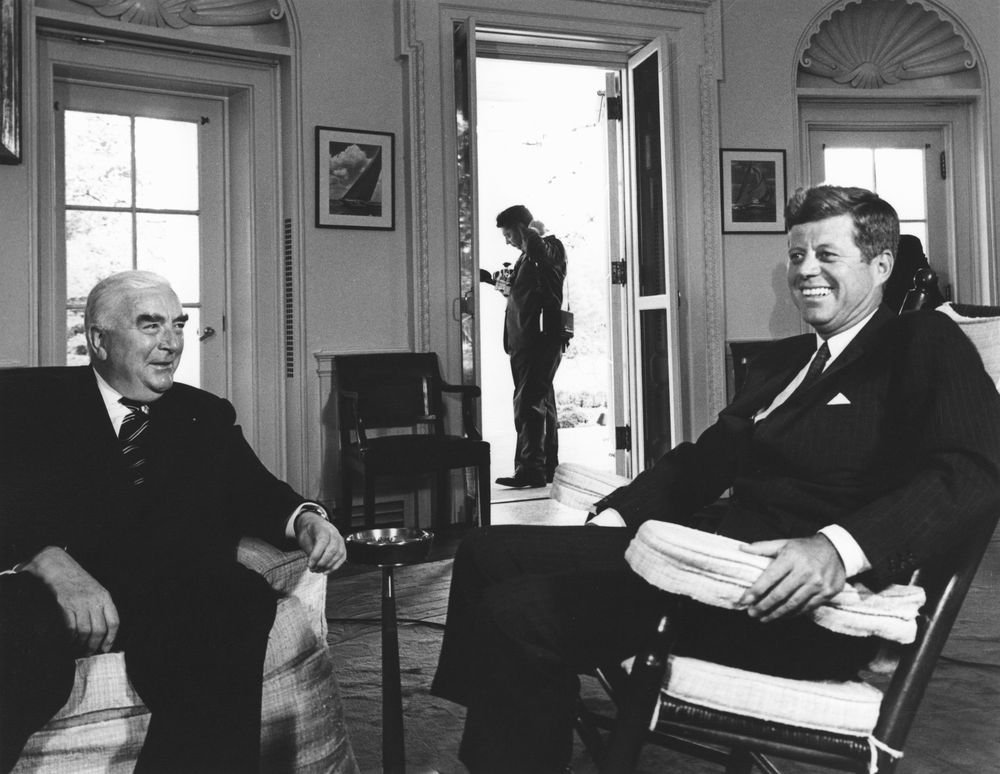On this day, 23 October 1962, the Menzies Government issues its first public response to the Cuban Missile Crisis, via a ministerial statement defending the actions of President Kennedy. Over the proceeding week the world would hold its collective breath, as the prospect of nuclear war loomed closer than it had ever been before.
The inciting incident for the crisis were photographs taken by American reconnaissance flights, which provided evidence that the Soviet Union was installing medium range ballistic missiles on the communist-controlled island led by their ally Fidel Castro, and these could potentially deliver a nuclear attack along much of the United States’ eastern seaboard. The US considered conducting an air-strike to take out the weapons and facilities, but instead Kennedy opted to publicly call-out the offending nations and urge them to back down, while also instituting a ‘quarantine’ to prevent any further weapons being delivered to Cuba (as opposed to a ‘blockade’ which would have been considered an overt act of war).
The Menzies Government had little advanced warning that the crisis was going to break before Kennedy delivered an urgent television broadcast, in which he explained:
‘We no longer live in a world where only the actual firing of weapons represents a sufficient challenge to a nation’s security to constitute national peril. Nuclear weapons are so destructive and ballistic missiles are so swift that any substantially increased possibility of their use or any sudden change in their deployment may well be regarded as a definite threat to peace….’
Menzies then responded in the Australian Parliament, outlining his view that:
‘The President has demonstrated the deceit practised by the Soviet Union and its determination by threat of aggression to terrorize nations whose only wish is for peace. We commend the President’s statement. Though inevitably dramatic, it was in essence defensive. We appreciate his reference to the vital importance of regional defensive agreements – agreements which are authorized by the United Nations Charter and which are necessary for the common safety of those living within the region. We welcome the readiness of the United States of America to bring the matter promptly before the United Nations.’
Australia proposed to support America’s UN endeavours, but was somewhat fearful that a UN resolution would condemn the broad concept of hosting a foreign nation’s military bases, which might limit Australian-US cooperation in the future, and that the Soviets might use the US precedent to start conducting their own strategic ‘quarantines’. Menzies refused to answer questions as to whether Australia would be willing to go to war over the missiles, leaving such matters for frantic discussion behind closed doors while publicly putting his faith in diplomatic processes. One key issue in the private deliberations was whether the ANZUS Treaty only applied to the Pacific and therefore the United States’ West Coast, but this line of thinking had to be abandoned as untenable considering it would likewise expose Western Australia as being confined to the Indian Ocean.
Like many issues of ANZUS ambiguity, the answer was luckily never tested, for the diplomatic efforts came to bear fruit. The crisis ended as abruptly as it had burst onto the international radar, with Khrushchev agreeing to remove the weapons under UN supervision, and in return America agreeing to quietly remove its own missiles housed in Italy and Turkey. In his memoir Afternoon Light, Menzies heaped praise on Kennedy’s handling of the situation and the manner in which the President had learned lessons from the ‘Bay of Pigs’ debacle to strike a lasting blow for world peace:
‘[W]hen he confronted Khrushchev over the Cuban missile bases he acted with courage and speed, and delivered the most powerful blow against Soviet expansionism that has been struck in post-war history. If, as I firmly believe, the tension between the Soviet Union and the Western World has lessened to a remarkable degree, the reason may be found not only in the successful Berlin air-lift, in the existence of the Nuclear Deterrent, and N.A.T.O., and the slow growth of an intellectual bourgeoisie in Russia, tremendously important as they were and are, but in Kennedy’s coup over Cuba.
For some years, I had a belief which I used to impose upon my more patient friends. “The historic moment of truth will come when the Soviet Chairman is confronted by a democratic leader who has the power and the personality to say ‘You go no further’, and who is believed. And the only man who can say this, and be believed, is a President of the United States.”’
Further Reading:
Laura Stanley, ‘Mates and Missiles: The Menzies Government and the Cuban Missile Crisis’, Honours Thesis, Victoria University, 2010, Laura Stanley.pdf (vu.edu.au)
Robert Menzies, Afternoon light: some memories of men and events (London: Cassell, 1967).
Sign up to our newsletter
Sign up for our monthly newsletter to hear the latest news and receive information about upcoming events.


